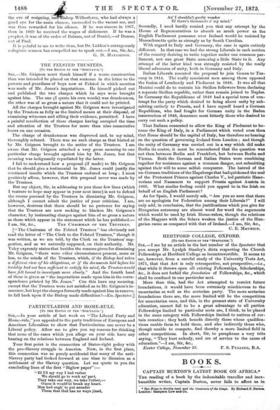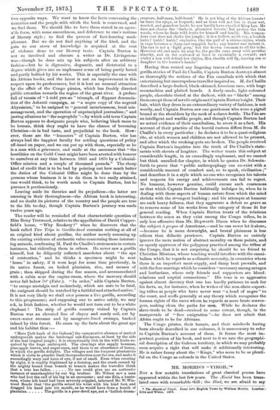BOOKS.
CAPTAIN BURTON'S LATEST BOOK ON AFRICA*
THE reading of a book by the indomitable traveller and inex- haustible writer, Captain Burton, never fails to affect us in • Two Tripe to aortae-teed end the Quonsets of the Congo. By Rtetiard.B.Bartos. London: Sampson Low and 0o.
two opposite ways. We want to know the facts concerning the countries and the people.with which the book is concerned, and we find them. We should like to have them stated in an agree- able form, with some smoothness, and deference to one's notions of literary style ; to find the process of fact-hunting made pleasant. But we do not find anything of the kind, and the gain to our store of knowledge is acquired at the cost of violence done to our literary taste. Captain Burton is not so involved and obscure a writer as Dr. Livingstone was—though he does mix up his subjects after an arbitrary fashion—but he is digressive, dogmatic, and dictatorial to a degree which gives one an unpleasant sense of being partly bored and partly bullied by MA works. This is especially the case with his African books, and the latest is not an improvement in this respect upon its predecessors, but it is lent an unusual attraction by the affair of the Congo pirates, which has freshly directed public attention towards the region of the great river. A preface full of taunts of "1-told you-so " triumph, of flippant denuncia- tion of the Ashanti campaign, as "a negro copy of the negroid Abyssinian," to be assigned to "general incuriousness, local mis- management, and the operation of unprincipled journalism ;" and jeering allusions to " the negrophile "—by which odd term Captain Burton appears to designate people who, believing black races to be human, think they ought to have the chance of becoming Christian—is in bad taste, and prejudicial to the book. How- ever, these are the " humours " of Captain Burton, who has always had the happiest faculty for settling questions of policy off-hand on paper, and we can put up with them, especially as he is a man with a grievance, and smile at the assurance that " the hostilities on the Gold Coast might have been averted with honour to ourselves at any time between 1863 and 1870 by a Colonial- Office mission and a couple of thousand pounds." The cheap kind of credit that is to be had by pointing out how much better the duties of the Colonial Office might be done than by the persons whose business it is to do them is too easily attained, one would think, to be worth much to Captain Burton, but he pursues it pertinaciously.
Leaving aside its theories and its prejudices—the latter are amusing in their thoroughness—the African book is interesting, and no doubt its pictures of the country and the people are true to the life to-day, though Captain Burton's journey was made twelve years ago.
The reader will be reminded of that characteristic question of Miss Betsy Trotwood, relative to the appellation of David Copper- field's house, " Why Rookery?" when he discovers that the book called Two Trips to Gorilla-land contains nothing at all of an original kind about gorillas, the author merely summing up the existing evidence of authentic value concerning those interest- ing animals, confirming M. Paul du Chaillu's statements in certain instances, but ridiculing them in others. He never saw a gorilla himself, but he diligently collected anecdotes about " the ape of contention," and he thinks a specimen might be sent ' home' in safety, if it were kept for some time previously, in its native forest, on boiled plantains, rice, and messes of grain ; then shipped during the fine season, and accommodated with a cabin near the engine-room, where the mercury should never fall below 70° (Fakir.). "In order," adds Captain Burton, "to escape nostalgia and melancholy, which are sure to be fatal, the emigrant should be watched by a faithful and attached native." It is not very likely we shall ever possess a live gorilla, according to this programme; and supposing one to arrive safely, we may ask, in Irish fashion, whether he would not turn out to be a white elephant ? The strip of gorilla country visited by Captain Burton was an elevated line of clayey and sandy soil, cut by sweet-water streams and by mangrove-lined swamps, backed inland by thin forest. He sums up the facts about the great ape and his habitat thus :- "Here [left bank of the Gaboon] the comparative absence of matted undergrowth makes the landscape sub-European, at least by the side of the foul tropical jungle ; it is exceptionally rich in the wild fruits re- quired by the huge anthropoid. The clearings also supply bananas, pine-apple leaves, and sugar-cane, and there is an abundance of honey, in which the gorilla delights. The villages and the frequent plantations which it visits to plunder limit its reproduction near the sea, and make it exceedingly wary and keen of eye, if not of smell. Even when roosting by night, it is readily frightened by a footstep, and the crash caused by the mighty bound from branch to branch makes the traveller think that a tree has fallen No one could give me an authentic instance of manslaughter by our big brother. Mr. Wilson saw a man who had lost the calf of his leg in an encounter ; and one Etia, a hunts- man, whose left hand had been severely crippled, informed Mr. W. Win-
wood Reads that ' the gorilla seized his wrist with his hind foot, and dragged his hand into his month, as he would have done a bunch of
plantains The gorilla is a poor-devil ape, not a 'hellish dream- creature, half-man, half.beast.' He is not king of the African forests; he fears the njego, or leopard ; and as lions will not live in those wet, wooded, and gameless lands, he can hardly have expelled King Leo. He does not choose the 'darkest, gloomiest forests, but prefers the thin woods, where he finds wild fruits for himself and family. His tremen- dous roar does not shake the jungle; it is a hollow, apish cry, a loudish huhh ! huhh ! huhh ! explosive, like the puff of a steam-engine, whish in rage becomes a sharp and snappish bark; any hunter can imitate it. The eye is not a light grey,' but the brown common to all the tribe. However old and male he may bo, the gorilla runs away with peculiar alacrity, and on the seaboard at least is essentially a coward; and whilst a hen will defend her chicks, Mrs. Gorilla will fly, leaving son or daughter in the hunter's hands."
Having thus routed any lingering traces of confidence in the gorilla stories of Paul du Chaillu, Captain Burton destroys almost as thoroughly the notions of the Fain cannibals with which that entertaining but unscrupulous traveller inspired us. M. du Chaillu described a large-limbed, black-skinned, ferocious race, with huge mustachios and plaited beards. A finely-made, light-coloured people, chocolate-tinted at the darkest, with no "blacks" among them except those of servile origin met Captain Burton's sight. Their hair, which they dress in an extraordinary variety of fashions, is not woolly, and Captain Burton saw one gentleman who wore a pigtail bound at the shoulders by the neck of a claret-bottle. The Fain are an intelligent and warlike people, and though Captain Burton had no actual evidence of their cannibalism, he avers it as a fact. His account of their practice of the horrid custom differs from M. du Chaillu's in every particular ; he declares it to be a quasi-religious rite, at which women and children are not allowed to be present, and after which the cooking-pots are broken. The people received. Captain Burton's inquiries into the truth of Du Clutillu's state- ments with shouts of laughter. The writer treats this subject at considerable length, in an exceedingly unpleasant, and we cannot but think uncalled-for chapter, in which he quotes Dr. Schwein- fiirth to prove that " public anthropophagy can co-exist with a. considerable amount of comfort and, so to speak, civilisation ;" and describes it in a style which no one who recognises his talents and respects his energy and achievements can fail to regret. No humour, however genuine, could excuse such comeness as that which Captain Burton habitually indulges in, when he is dealing with those aspects of human nature from which the mind shrinks with the strongest loathing ; and his attempts at humour are such heavy failures, that they aggravate a defect so grave as to remove some of his works from the category of those fit for general reading. When Captain Burton treats of the relations. between the sexes as they exist among the Congo tribes, he is only less offensive than Mr. Hepworth Dixon when he discusses the subject a propos of Americans,—and he can never let it alone, —because he is more downright, and brutal plainness is less odious than didactic prurience. Captain Burton so entirely ignores the mere notion of abstract morality on these points, and so openly approves of the polygamy practised among the tribes of the Congo, that it is not surprising lie should be no friend to Christian Missions, whose teaching would interfere with the canni- balism which he regards as a climatic necessity, in countries where there is an imperfect meat-supply, and damp heat prevails, and with the free marriage which he considers " necessary among savages and barbarians, whose only friends and supporters are blood- relations and nuptial connections." His tone is so aggressive against almost decency that one has hardly patience to seek for his facts, as, for instance, when he writes of the non-slave-export- ing tribes as people who have never sent " a head of negro " to the coast, and scoffs generally at any theory which recognises the human rights of the races whom he regards as mere brute scaven- gers, making clean the paths for men. While he declares the slave-trade to be dead—revived to some extent, though, in the masquerade of " free emigration "—he does not admit that Africa ought to be for Africans.
The Congo pirates, their haunts, and their misdeeds having been already described in our columns, it is unnecessary to refer to Captain Burton's account of them. It forms the most im- portant portion of his book, and next to it we rate the geographi- cal description of the Gaboon territory, in which we may probably soon acquire a right that will make it additionally interesting. He is rather funny about the " Kings," who seem to be as plenti- ful on the Congo as colonels in the United States.



































 Previous page
Previous page